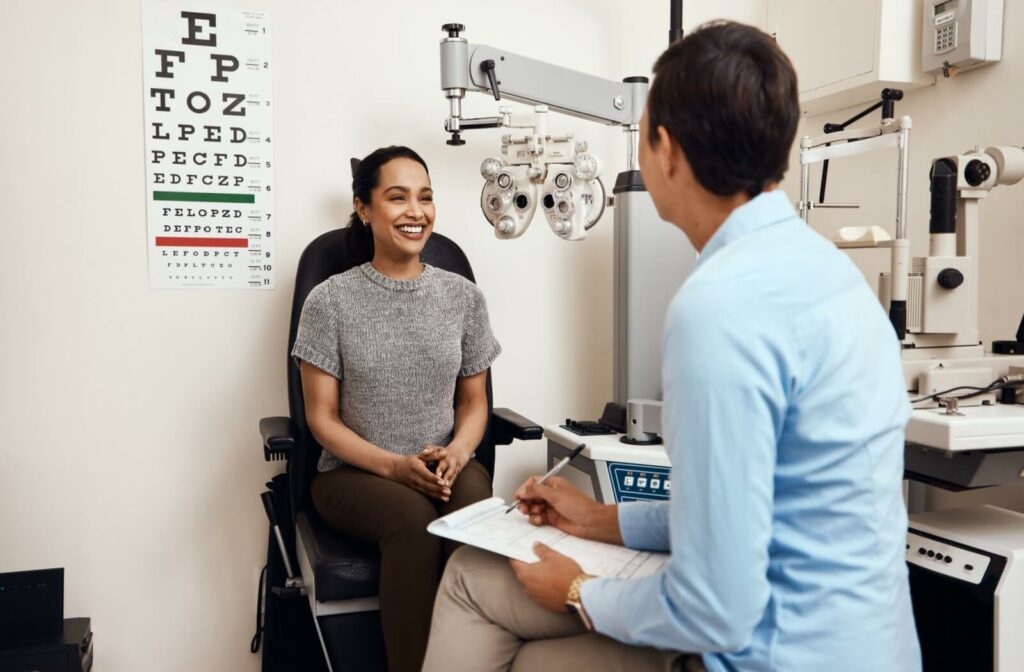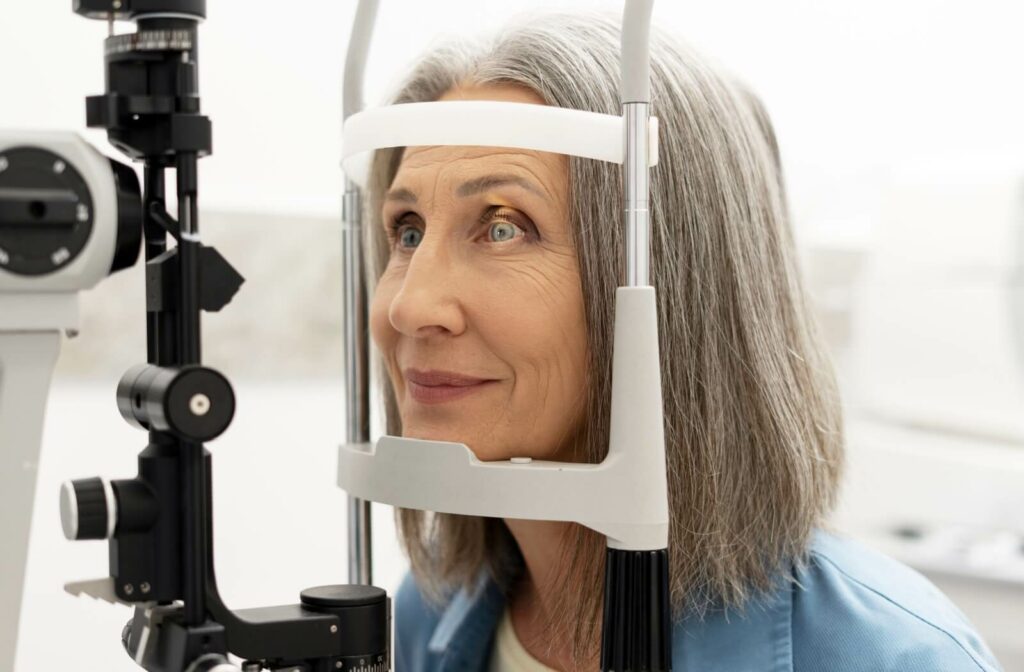Eye exams can tell us much more than whether we need glasses or contact lenses. Small changes in the eyes can reflect larger changes happening in the body.
An eye exam can reveal early signs of diabetes and help us understand how well your current diabetes management is working.
Regular visits to the eye doctor provide valuable insights that can help you protect your vision and monitor your overall health.
How Diabetes Affects the Eyes
Diabetes can have a significant impact on eye health, particularly when blood sugar levels remain uncontrolled.
Over time, high blood sugar can damage the tiny blood vessels in the eyes, leading to a range of complications, including diabetic retinopathy, diabetic macular edema (DEM), glaucoma, and cataracts.
Each of these conditions can develop without noticeable symptoms, and often, your optometrist will recognize the first signs during a comprehensive eye exam.
Diabetic Retinopathy
Diabetic retinopathy is a common diabetes-related eye condition where high blood sugar levels damage the retina’s blood vessels. It can include symptoms such as blurred vision or dark spots in the visual field; however, it may be asymptomatic in its early stages.
Diabetic Macular Edema (DME)
Diabetic macular edema (DME) occurs when the macula, the central part of the retina responsible for sharp vision, swells due to leaking blood vessels. Left untreated, DME can lead to vision loss, including distorted or blurry vision and dull colors.
Glaucoma
Diabetes increases the risk of developing primary open-angle glaucoma, the most common type of glaucoma. The disease causes damage to the optic nerve, preventing visual information from reaching the brain and leading to irreversible vision loss if not managed properly.
Cataracts
People with diabetes are more likely to develop cataracts at an earlier age. A cataract is a cloudy, rigid formation on the eye’s lens that can blur vision, dull colors, and increase sensitivity to light and glare.
Cataracts worsen gradually and may require surgery to correct in later stages.
What an Eye Exam Can Reveal
Eye exams are more than just a check-up on vision clarity or finding the right prescription for glasses. They also serve as a window into the body’s overall health.
Using diagnostic tools, your optometrist can identify signs of diabetes-related conditions by monitoring changes in eye tissue and blood vessels, often long before noticeable symptoms appear.
During a dilated eye exam, your eye doctor may observe swelling or leaking blood vessels in the retina, which could indicate diabetic retinopathy.
Changes in the shape or size of the blood vessel or the presence of fatty deposits can also signal early diabetes-related complications, providing a key opportunity for early intervention.
Regular Eye Exams Help You Take Control of Your Health
If you’re living with diabetes or have a higher chance of getting it, regular eye exams are essential. These exams can thoroughly examine the eye to monitor for subtle changes and support the early detection of diabetes-related eye issues.
Early detection is crucial for prompt intervention or treatment, which can significantly affect the likelihood of positive outcomes for vision and overall health. Early treatment can prevent significant vision loss in 90% of people with diabetic retinopathy.
Without regular check-ups, conditions like diabetic retinopathy and glaucoma can progress to advanced stages, where treatment options become more limited and can be less effective.
For those already living with diabetes, diabetic eye exams can provide a clearer picture of how effectively the condition is being managed. Changes in eye health may indicate the need to modify treatment plans to help regulate blood sugar levels.
Routine eye exams are a proactive step that can protect your health in the long term. Think of regular visits to your eye doctor as a valuable investment in your overall wellness.

What to Expect During an Eye Exam
A comprehensive eye exam involves more than reading letters on a chart. For those at risk for diabetes-related complications, your optometrist might perform the following tests:
- Pupil dilation, using eye drops to widen the pupils, allowing a clearer view of the retina & optic nerve
- Optical coherence tomography (OCT), a noninvasive imaging technology, captures detailed images of the retina, macula, & blood vessels
- Visual field test, a noninvasive test that checks for blind spots & evaluates peripheral vision that may result from glaucoma or related conditions
- Tonometry test to measure eye pressure & check for glaucoma
- Slit-lamp examination, using a specialized microscope that provides a magnified view of the structures at the front of your eyes, including the cornea, lens, & iris
Each assessment plays a role in painting a fuller picture of your eye health to help identify any concerns.
Diabetes Management
While diabetes can impact your vision, taking proactive steps to manage your health can reduce the risk of complications. Here are ways to help protect your eyes and overall well-being:
- Control blood sugar levels through a balanced diet, regular exercise, & following your doctor’s recommendations for medications or insulin
- Monitor blood pressure & cholesterol, keeping them in check to protect your eyes & overall health
- Quit smoking, as it reduces blood flow throughout the body, increasing the risk of diabetic eye conditions
- Wear protective eyewear, including sunglasses that block UVA & UVB rays to protect your eyes from damage caused by UV light exposure
- Stay consistent with eye exams by scheduling regular check-ups with your optometrist to help identify & address any changes to your eye health promptly
See Clearly to Live Confidently
Your eyes are a powerful tool—not just for experiencing the world around you but also for understanding your health. Prioritizing regular eye exams means protecting your vision and taking an active role in your overall wellness.
Bethel Vision Care is here for you and your family. Our experienced team offers comprehensive exams using modern technology, helping you maintain clear vision and supporting your health.
Don’t wait until symptoms appear. Book your appointment today and see the difference personalized care can make.



